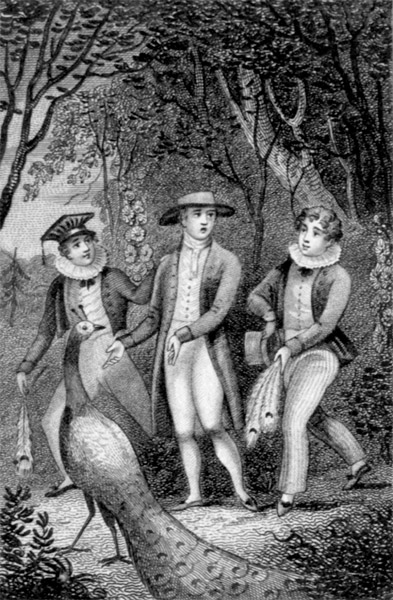the
LITTLE QUAKER;
or, the
TRIUMPH OF VIRTUE.
A TALE
for the instruction of youth.
To hide the faults I see;
That mercy I to others show,
That mercy show to me.
pope.
LONDON:
PRINTED FOR WILLIAM COLE,
10, NEWGATE STREET.
PRINTED BY G. H. DAVIDSON,
IRELAND YARD, DOCTORS’ COMMONS.
FRONTISPIECE.
 The little Quaker remonstrating with George & WilliamHope for their cruelty. p. 11.
The little Quaker remonstrating with George & WilliamHope for their cruelty. p. 11.[3]THE LITTLE QUAKER.
GEORGE and WILLIAM HOPE were the only children of a gentleman offortune, who lived in a fine house at the entrance of a pretty villagein Berkshire.
It was this worthy gentleman’s misfortune to be the father of two veryperverse and disobedient sons; who, instead of trying to please him bydutiful and obliging conduct, grieved him continually by their unworthybehaviour, and then were so wicked as to laugh at the lessons ofmorality their parent set before them.
When they returned from school to spend the holydays, they neglectedtheir studies to roam about the streets with [4]low company; from whomthey learned profane language, vulgar amusements, and cruelty toanimals; but such conduct, as may well be supposed, did not conduce totheir happiness. They had no friends among the good and virtuous intheir own rank in life; and were even despised and condemned by the badcompanions, who, in the first instance, had encouraged their depravity.
Their idle pursuits gave Mr. Hope great pain, who tried, by gentleremonstrances, to make them ashamed of their evil propensities; but,finding that kindness had no effect in their ungenerous dispositions, hedetermined for the future to punish them severely, whenever theydisobeyed his commands.
Mr. Hope had a very near neighbour, whose meadow and pleasure-gardenwere only separated from his by a high row of paling. Mrs. Shirley, forso this lady was called, was a very excellent and benevolent woman, anda member of that [5]respectable society of friends commonly known by thename of Quakers.
Mrs. Shirley was a widow; and, having lost her own family, she broughtup her two grandchildren, a youth of fourteen years of age, and a prettylittle girl, who scarcely reckoned half that number of years.
Josiah Shirley was at once his kind Grandmamma’s pride and comfort; and,from his amiable and obliging conduct, was justly esteemed and belovedby the whole village; and his name was never mentioned without thepraise his modest and gentlemanlike behaviour deserved.
Mr. Hope had often contrasted, with feelings of regret, this sweet boy’sconduct with that of his own sons; and, hoping that his gentle temperand moral pursuits might have some effect on the pe